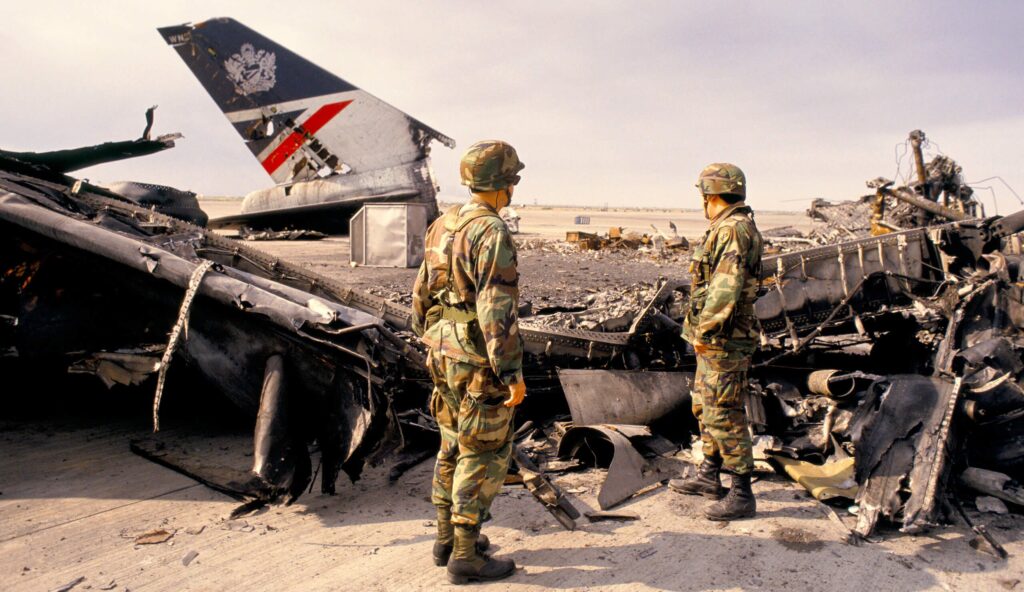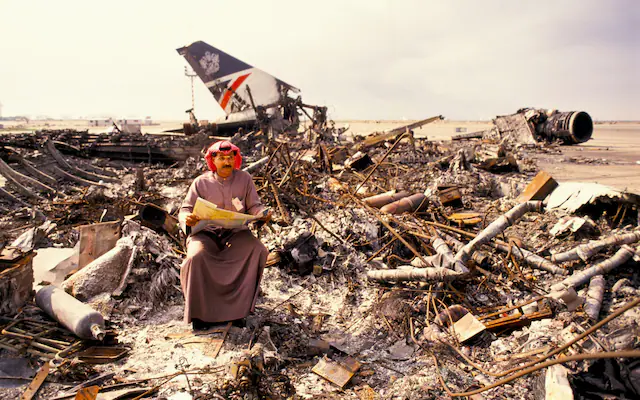In a moment that has taken over three decades to arrive, 94 former passengers and crew members of BA Flight 149 have launched legal proceedings against British Airways and the UK government. These individuals claim they were knowingly put in harm’s way in August 1990, during the Gulf crisis, when their flight landed in Kuwait just hours before Iraq launched its full-scale invasion.
The lawsuit, filed in the United Kingdom, accuses both entities of gross negligence and deception. Survivors assert that they were sacrificed for political and military motives—used as pawns in a larger geopolitical game—while the world watched in disbelief.
The Flight That Should Never Have Landed
On August 1, 1990, BA Flight 149 left Heathrow Airport en route to Kuala Lumpur with a scheduled stopover in Kuwait City. The flight seemed routine, but beneath the surface, diplomatic channels were buzzing with warnings of an imminent invasion by Iraqi forces.
Passengers, including tourists, business travelers, families, and British Airways staff, had no reason to believe they were entering a war zone. The UK’s ambassador in Kuwait had already raised alarm bells, and there were credible reports suggesting military mobilization near the Kuwaiti border. However, British Airways allowed the flight to proceed, and crucially, no warning was issued to divert or delay it.
Hours later, Iraq invaded Kuwait. BA Flight 149 landed directly into the chaos. The Kuwaiti airport quickly became a battleground, and the aircraft was grounded. What should have been a brief stopover turned into a living nightmare.
From Passengers to Hostages

Shortly after landing, all 367 people on board were detained by Iraqi forces. Many passengers and crew members were held as hostages for several months, some enduring unspeakable abuse. The captives were scattered across strategic sites such as oil refineries and military installations, used by Saddam Hussein’s regime as “human shields” to deter Western airstrikes.
For the hostages, every day was filled with uncertainty, fear, and humiliation. Among them was five-year-old Stuart Lockwood, who was paraded on state television with Saddam Hussein in a photo opportunity that shocked the world. To outsiders, the image may have suggested a child being cared for, but in reality, it masked the trauma and manipulation taking place behind the scenes.
Crew members suffered alongside passengers. Some reported being physically and sexually assaulted, held at gunpoint, and threatened with death. Their captivity stretched on for weeks, with very limited access to food, hygiene, or communication with loved ones back home.
Claims of a Secret Intelligence Operation
One of the most explosive elements of the lawsuit is the claim that British Airways Flight 149 was allowed to land in Kuwait to serve a covert military purpose. Survivors and legal representatives argue that the UK government used the flight as cover to insert intelligence officers into the country just before the invasion.
This theory has long circulated but gained substantial weight in 2021 when declassified documents revealed that UK officials had known about the imminent invasion. Despite this, British Airways was never instructed to cancel or reroute the flight.
Witnesses from the flight claim they saw a group of men deplane quickly upon landing and vanish without reappearing among the detained passengers. One British military officer was reportedly waiting to greet these men—adding further credibility to allegations of a covert mission disguised as civilian air travel.
Stories of Survival and Lasting Pain
For survivors like Charlie Kristiansson, a flight steward aboard BA 149, the experience left permanent scars. Kristiansson recalls being moved from one dangerous location to another, used as a human shield in areas targeted by coalition forces. He speaks of sexual assault, repeated threats, and psychological torment.
Other passengers describe similar horrors—people confined in dark rooms, hearing bombs explode in the distance, and begging for basic needs. Many still suffer from post-traumatic stress disorder, physical ailments, and fractured relationships as a result of the trauma endured.
The mental health toll has not lessened over the decades. Survivors say they have been forced to carry a burden of silence while being gaslighted by institutions that should have protected them. Now, with this legal action, they are breaking that silence.
The Long Road to Legal Action
It has taken 34 years for these individuals to formally pursue justice. The delay is attributed to both the suppression of key information and the emotional toll the experience took on the victims. Many were reluctant to come forward or doubted their voices would be heard.
The lawsuit accuses both British Airways and the UK government of negligence, failure to warn, and misfeasance in public office. Plaintiffs argue that they deserve not only financial compensation but also public accountability for a sequence of events that changed their lives forever.
Lawyer Matthew Jury, representing the group, stated that the aim of the legal action is not just reparation—it’s also about truth, closure, and dignity. He emphasized that while financial compensation may help address some consequences, only transparency and admission of wrongdoing will help truly heal the psychological wounds inflicted.
The Institutional Response—Or Lack Thereof
British Airways and the UK government have so far remained largely silent on the current lawsuit. While the government has consistently denied claims of any covert operation and refrained from offering compensation, the mounting evidence and public support may force a change in narrative.
Survivors and their legal teams hope that this lawsuit will be a turning point—not only for themselves but for others who have been misled or sacrificed in times of political expediency. Their courage to speak out now is igniting renewed conversations about accountability, ethics, and transparency within both government and corporate sectors.
Seeking Justice, Healing, and Truth
What happened on August 2, 1990, was not a miscommunication or a simple mistake. The plaintiffs believe it was a conscious decision that placed innocent lives at risk for ulterior motives. Their fight for justice isn’t just personal—it speaks to a broader call for ethical leadership in times of crisis.
The survivors of BA Flight 149 have waited too long. Their legal action may finally shed light on what really happened that night, bring long-awaited accountability, and restore a sense of justice that was denied to them for decades.
As the case proceeds, it remains a powerful reminder of how state decisions—shrouded in secrecy—can alter the course of individual lives, and why the pursuit of truth, no matter how delayed, remains essential.
Kuwait’s New Mortgage Law Set to Unlock Homeownership and Economic Growth



